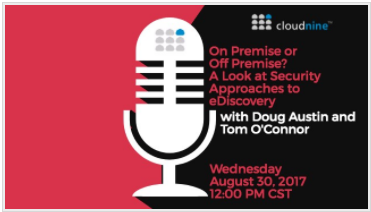Ten Items to Keep in Mind When Considering Cloud Providers: Cybersecurity Best Practices
Ten Items to Keep in Mind When Considering Cloud Providers: Cybersecurity Best Practices https://cloudnine.com/wp-content/uploads/2016/06/Clouds.jpg 500 333 CloudNine https://cloudnine.com/wp-content/uploads/2016/06/Clouds.jpgIn my webcast discussion with Tom O’Connor yesterday, we had a terrific discussion of several pros and cons of both on-premise and off-premise (cloud) eDiscovery technology solutions as well as other factors to consider. If you missed the webcast, you can check it out here. But, if you’re considering a cloud solution, how do you know whether the solution(s) you’re considering have the security mechanisms your organization needs? Here’s a list of factors to consider.
read more







